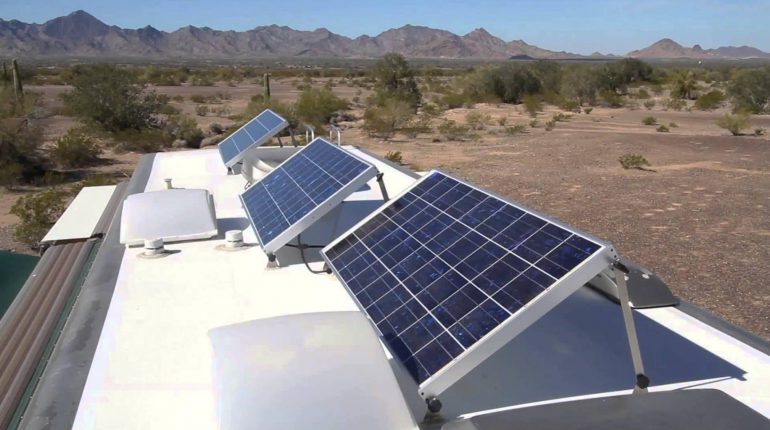Once it comes to powering the many appliances on recreational vehicles these days, RVers have a variety of choices from batteries to generators. That being said, for people that travel extensively and wish to cut down utility bills, solar energy is usually preferred.
Overall, with a sound solar setup around, you could increase the versatility of your rig on the road and save a few bucks as well. But unless you acquire the best solar panels for RV, your solar setup may only offer negligible gains which is why you must choose wisely.
Common Types Of RV-Oriented Solar Panels
The market of solar panels for RV packs an assortment of models but they could be put into three types: polycrystalline, monocrystalline and thin-film. To secure the best solar panels for RV available for purchase, it’s of utmost importance that you grasp the traits of the panel types.
1. Polycrystalline Solar Panels
Made by melting raw silicon, polycrystalline solar panels come at affordable prices that make them highly sought after by a number of budget-minded RVers. Being low-cost, models of the type happen to be well-suited for big applications. As for the shortcomings, polycrystalline solar panels have mediocre efficiencies. In addition, many products with polycrystalline solar cells don’t handle heats particularly well which means they may fail early if exposed to extreme temperatures.
2. Monocrystalline Solar Panels
Using pure silicon, monocrystalline solar panels have excellent efficiencies compared to other types of panels. Moreover, products of types endure high temperatures well so they would be outstanding choices in a wide range of travels. The monocrystalline solar cells also work like a charm in conditions like partially shaded, low light, … In exchange, monocrystalline solar panels tend to be accompanied by relatively expensive price tags, hence, you need to have a fat wallet to get them.
3. Thin-Film Solar Panels
Able to be bent, thin-film solar panels prove to be unmatched regarding adaptability: you could put them to good use in lots of settings. Due to the ease of production, the fair-price panels of the type match the shopping budgets of multiple RVers. However, thin-film solar panels feature pretty modest efficiencies so in power-hungry recreational vehicles, they often have limited values. Still, for expedient power on the move, thin-film solar cells will surely come in handy.
How to Choose The Best RV Solar Panels
Preferences change significantly from person to person, therefore, different RVers often have different ideas about what could be called the best RV solar panels nowadays. Nonetheless, if you wish to make rewarding investments, it’s strongly recommended that you keep the following criteria in mind.
Efficiency
In case you don’t know, the efficiency of a particular solar panel indicates how much sunshine it’s able to convert into usable electricity. So to put it plainly: the higher the efficiency, the more energy would be produced. The efficiency of the average panels on the market stays around 15% but in advanced models, it may rise well above 20%. Take into account the power consumption of the appliances you have on your vehicle in order to determine a firing efficiency for your solar panels.
Dimensions
In general, for ideal sunlight exposure, RV-oriented solar panels tend to be installed on the roof of recreational vehicles. Thus, RVers must give the sizes of the panels some thoughts before putting things together. If you have solar panels with suitable dimensions, optimizing the available space on the roof is going to be just a walk in the park. To make an informed decision here, you should definitely use the measurements of the roof of your rig as references. In addition to that, test out various panel groupings to see which one works out.
Weight
After picking up the panels, you need to move them up to the roof of your RV for installation, a tedious process if they prove to be cumbersome and unwieldy. So as to facilitate the panel setup, it’s widely advised that you consider sticking to lightweight products if possible. By getting robust solar panels with manageable bulks, you could save a lot of time and effort during the installation. Furthermore, if you keep the weights of the panels down then you would be able to avoid overloading the chassis.
Endurance
Of course, everything eventually fails but you certainly don’t want to buy replacement solar panels every couple of months. Even if they indeed seem to be cheap, flimsy models actually cost you more in the long term as you have to replace them frequently. Hence, while searching around for the best solar panels for RV battery charging, it’s essential that you prioritize long-lasting products. Panels that hold together for extended periods of time undoubtedly boost the performance of RV solar setups in the outdoors.
Brands
RVers may purchase solar panels from a variety of manufacturers but to be on the safe side, you should grab yours from reputable names such as Renogy, HQST, WindyNation, ACOPower, … In most of the cases, popular brands have superior quality controls, post-purchase support and warranties to lesser-known ones. That is why if you would like to get your money’s worth, look out for panels from the mentioned labels. Though models from famous manufacturers fail to deliver satisfaction on occasions, they remain solid options.
